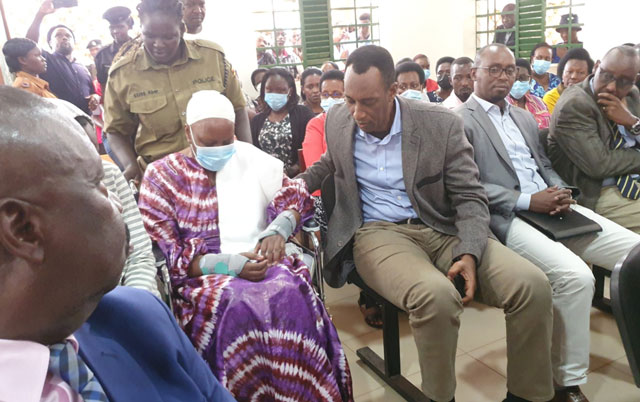
Ssegirinya’s case has underscored broader issues with Uganda’s justice system, particularly its handling of accused persons in need of medical attention
Kampala, Uganda | THE INDEPENDENT | Molly Katanga was controversially denied bail after a dramatic shift of goalposts by presiding judge Isaac Muwata, who had promised the ailing widow of Henry Katanga a speedy decision in her husband’s murder trial.
Katanga, accused of killing her husband and former businessman Henry Katanga on November 2, 2023, was forced out of the hospital – where she was undergoing specialized treatment – charged, and remanded to Luzira Prison.
Brought to court in a wheelchair amid claims that she was feigning illness to evade justice, government examiners later confirmed her injuries were severe. Despite medical reports recommending specialized care, Judge Muwata denied her bail, scheduling the trial for July 2, 2024, with assurances of a swift process.
However, the trial has faced repeated adjournments, effectively stalling by the end of November while Molly remains in detention.
The passing of former Kawempe North MP Muhammad Ssegirinya has intensified the debate over the constitutional right to bail. His denial of bail, despite needing medical treatment for a chronic ailment, has prompted government apologies but also renewed scrutiny of cases like Katanga’s.
In his April 18, 2024, ruling, Judge Muwata justified denying Molly bail by stating, “Since the matter has been fixed for hearing, it is in the interest of justice that her bail is denied.” He assured a speedy trial, yet months later, adjournments have stalled proceedings with no significant progress.
Critics argue that these delays violate her right to a fair and timely trial, imposing psychological and emotional strain on both the accused and the victim’s family while undermining public confidence in the judicial system.
Molly’s defense team has expressed frustration over the prosecution’s failure to present evidence on time, further prolonging the process. “The system is failing our client. The promise of a speedy trial has turned into a painful wait for justice, while her health continues to deteriorate,” said her attorney, Peter Kabatsi.
Medical reports continue to emphasize her need for specialized care, raising urgent concerns about her detention.
Ssegirinya’s case has underscored broader issues with Uganda’s justice system, particularly its handling of accused persons in need of medical attention. Before his passing, MP Allan Ssewanyana lamented, “If Ssegirinya had been granted bail to seek proper medical treatment, he might still be alive today. The system ignored his pleas, and now we’ve lost him.”
Meanwhile, President Yoweri Museveni has remained firm in opposing bail and police bonds for serious offenses, reiterating in his New Year address: “Bail and police bonds must stop in cases involving grave offenses. It only worsens crime and undermines justice.”
Critics argue that this stance contradicts constitutional guarantees. MPs like Asuman Basalirwa and Muwanga Kivumbi have condemned the government’s approach, with Basalirwa emphasizing, “The independence of the judiciary must be protected. The executive cannot dictate decisions on bail. It is a constitutional right.”
Molly Katanga’s case epitomizes the ongoing dilemma between enforcing justice and upholding individual freedoms. With her trial effectively stalled, the need for judicial reforms ensuring fair and timely trials has never been more pressing.
Her continued incarceration, despite clear medical concerns, raises serious ethical and legal questions about Uganda’s justice system. While the state must ensure justice and public safety, it must also safeguard constitutional rights, including bail and access to proper medical care.
Failure to strike this balance risks eroding public trust in the legal system and escalating human rights concerns.
 The Independent Uganda: You get the Truth we Pay the Price
The Independent Uganda: You get the Truth we Pay the Price



